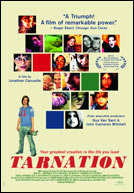 One of the year’s big stories in film was Jonathan Caouette’s haunting autobiographical feature Tarnation (trailer), famous as much for its methodology and tiny budget as for its strength as cinema. Made entirely on Apple iMovie on a desktop computer, and costing a mere $218.32, Tarnation is a patchwork quilt of sound, image and testimony, chronicling the troubled life of its author and his relationship with his fractured mother.
One of the year’s big stories in film was Jonathan Caouette’s haunting autobiographical feature Tarnation (trailer), famous as much for its methodology and tiny budget as for its strength as cinema. Made entirely on Apple iMovie on a desktop computer, and costing a mere $218.32, Tarnation is a patchwork quilt of sound, image and testimony, chronicling the troubled life of its author and his relationship with his fractured mother.
The remarkable thing about Tarnation is that Caouette made it in much the same way he might have written a print autobiography – alone, at a computer, pouring over a lifetime’s accumulation of notes, scraps and memories. Only, the notes and scraps are in the form of VHS and Super-8, photographs and answering machine tapes. Growing up in the Houston suburbs, Caouette became literate in a multitude of forms, weaving a rich web of fiction as a blanket between him and his often-grim reality. These fictions ranged from eerie staged “confessions” by an 11-year-old Caouette impersonating a battered woman, to glamorous lip-synch music videos, to high school slasher flics. Tarnation is as much the story of this self-education in alternate forms of writing as it is of Caouette’s family and upbringing.
Watching Tarnation isn’t quite like watching other films, and the fact that it was made by a single, solitary person has a lot to do with this. It has long been taken for granted that film is the product of collective labor, that behind each frame lurk dozens of invisible hands. But here, as with a book, there is a single author, and you sense palbably that you are witnessing the craft of a private forge, far from the world of studios and crews – far from our usual notion of “the production.” And as with a book, our encounter is very personal and unmediated – we are brought directly into the dreams and psychedelia of the author’s mind.
Caouette describes the experience on the film’s website:
 “TARNATION is designed to mimic my thought processes so the audience can also feel like they’re in a living dream, which can be scary and intense, but also beautiful and glorious. TARNATION is a documentary in the sense that it’s a true story but it’s also a happening, an encounter, and a way for you to meet me and for me to meet you.”
“TARNATION is designed to mimic my thought processes so the audience can also feel like they’re in a living dream, which can be scary and intense, but also beautiful and glorious. TARNATION is a documentary in the sense that it’s a true story but it’s also a happening, an encounter, and a way for you to meet me and for me to meet you.”
Caouette’s film demonstrates the possibility for lone artists to engage powerfully in media that were previously very difficult and expensive to access. Already, people are producing highly polished videos made with digital snapshot cameras. The modes of production – of writing – will continue to increase and expand.
Tarnation is also a clue to possible new directions for documentary and autobiography in the digital age, and hints at ways that films and books might begin to merge.
Gus Van Sant, who became one of the film’s executive producers, told Wired in January: “People assumed that one day film would be as accessible and inexpensive as writing, and now it practically is. For the price of a typewriter, you can make films with sound and burn them on a DVD.”
if:book
A Project of the Institute for the Future of the Book
